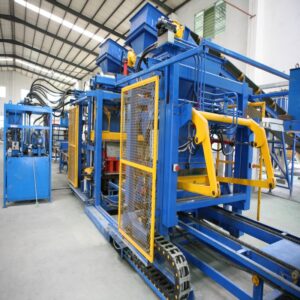A block maker machine can facilitate the recycling or reuse of waste materials in several ways:
- Material Compatibility: Many block maker machines are designed to process a wide range of raw materials, including recycled or reclaimed materials such as crushed concrete, construction waste, fly ash, slag, and industrial by-products. By accepting diverse input materials, block maker machines enable the recycling and reuse of waste materials that would otherwise be discarded or disposed of in landfills.
- Mixing and Blending: Block maker machines incorporate mixing and blending mechanisms that homogenize raw materials, ensuring uniform composition and quality in the finished blocks. By mixing recycled materials with traditional aggregates or binders, block maker machines can produce high-quality blocks that meet industry standards and performance requirements, thereby enhancing the viability of recycled material utilization in construction applications.
- Particle Size Reduction: Some block maker machines feature built-in crushers or pulverizers that reduce the size of bulky or irregularly shaped waste materials into smaller, uniform particles suitable for block production. By shredding or pulverizing waste materials, block maker machines facilitate the processing of diverse feedstocks and enhance the efficiency of material recycling and reuse efforts.
- Material Compaction: Block maker machines apply compression and compaction forces to raw materials, transforming them into compacted blocks with high structural integrity and strength. By compacting recycled materials into durable blocks, block maker machines enable the utilization of waste materials in load-bearing construction applications, such as retaining walls, pavements, and building foundations.
- Customization Options: Many block maker machines offer customization options for block design, size, shape, and composition, allowing operators to tailor block specifications to specific project requirements or material availability. block maker machine By accommodating variations in recycled material properties and characteristics, block maker machines enable the optimization of material utilization and resource efficiency in construction projects.
- Quality Assurance: Block maker machines incorporate quality control mechanisms, such as automated monitoring systems and standardized production processes, to ensure consistent block quality and performance. By adhering to strict quality standards and specifications, block maker machines enable the use of recycled materials in construction applications without compromising structural integrity, durability, or safety.
- Waste Reduction: By converting waste materials into value-added products, such as concrete blocks, pavers, or bricks, block maker machines help reduce the volume of waste sent to landfills and mitigate environmental impacts associated with waste disposal. By promoting material recycling and reuse, block maker machines contribute to sustainable waste management practices and resource conservation efforts.
Overall, block maker machines play a crucial role in facilitating the recycling or reuse of waste materials by processing diverse feedstocks, mixing and blending raw materials, reducing particle size, compacting materials into blocks, offering customization options, ensuring quality assurance, and reducing waste generation. By enabling the utilization of recycled materials in construction applications, block maker machines contribute to resource efficiency, environmental sustainability, and circular economy principles in the building and construction sector.
